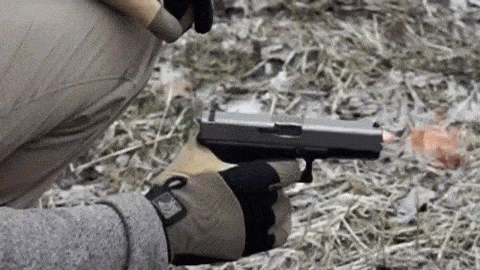That's a good question. I had to stop for a second. Just what
was I trying to say? Hmmmm…
I slept on it.
Turns out it is intuitive and very obvious, and not so at the same time. At least to me.
TL;DR:
A) It is very probable that NO ONE is 100% firearm safe 100% of the time, and random events happen. B) Thus everyone should use a safety. If A & B, then it follows that using a safety is
relying on the safety to be safe.
As to how I got to this unsurprising place, below are the sort of statements that I'm critiquing. Sorry if it feels like I'm picking on you,
@Max. It's not personal and statements like the ones below are pretty common.
Why I bothered to do this at all is that I'm not a genius; I had to separate the swirling arguments about different safety types with the semi-boastful statements about how people handle their firearms. Is X safety better than Y safety, and in whose hands? Do training and situational awareness
always trump the importance of a safety's use? I knew that it's common sense to use a safety, I mean, c'mon, but how do I get there logically?
The logic in the above two quotes goes like this:
- I never make firearm safety mistakes
- "Fortunately for my hunting partner, none of the above issues impacts his safety. I do NOT rely on the safety to keep him safe."
- I do make other mistakes
- Manual safeties are not required for people like me to be safe
- "Anyone who requires a manual safely to be safe with a firearm, needs to meet up [with the] 'oh don’t worry, it’s unloaded' crew and take their guns to the local Sheriff’s dept and turn them in, for everyone’s safety."
- I exist in this world
- Random events & accidents do happen to me
- I get surprised
- "It is not unusual to find that the safety has been erroneously knocked to the off position."
Now, I'm no trained formal logician (should be obvious), but
on its face, the above logic chain makes no sense.
I trust people can see how bullet point #1, to put it mildly, is improbable.
Don't believe me? Ok, I'll set improbability aside and damn the torpedos! Let's take the logic chain above to its ludicrous extreme: if this human exists, he needs not a safety at all.… it just drags him down.
@308pirate remember your statement about manual safeties vs Glock safeties? That they add "
one more link that needs to work right in the sequence of events to fire" a gun? Well, a manual safety to
@308pirate is like ANY safety to this idealized firearm owner; just dead weight, just yet another mechanical item to fail.
And finally, to kick it up a notch, let's pretend this ideal firearm owner does indeed exist. But surely he exists in a world of dumbasses, rando Joe Bob's that, via the
Dunning Kruger effect, think tha
t they are also 100% firearm safe and don't "rely on their safety" while they muzzle you!
My point is yes, you do indeed rely on your safety.
Ok, whew. Where does this leave us? If I'm honest with myself, I think:
- I exist in a world in which unpredictability abounds
- Then, it is overwhelmingly probable that I, too, can act in an unpredictable manner
- i.e. I am a fallible human being; I can sometimes make mistakes and create accidents
- ergo, It is improbable that I can be 100% firearm safe if I exist in this world
- Thus, to guard against firearm accidents, the best I can do is to try to construct a fault-tolerant firearm safety system by:
- training to the firearm safety rules like these (but not only these)
- avoiding people that are not safe with their guns
- training with my firearm to get competent
- using my firearm's safety and encouraging its use by others
 realizing that the act of just using my safety inevitably means I am relying upon it. Otherwise, why use it? Tradition? Superstition? Allahu Akbar? SpongeBob?
realizing that the act of just using my safety inevitably means I am relying upon it. Otherwise, why use it? Tradition? Superstition? Allahu Akbar? SpongeBob?
Why is that very last bullet so very important?
Because
not owning up to the fact that you
do indeed rely upon your safety may actually make one
more unsafe by feeding into a potential "competence" complex, whereby you feel like you do not make mistakes.
Of course, I get a dose of humility by realizing that even if I do all of these “safe” things, accidents may happen nonetheless.
Finally,
@308pirate, for your choice of a defensive pistol I think you've made a decent tradeoff with a Glock. You're an expert, you practice, you prioritize high speed and fewer discrete actions. Especially in a stressful situation, there's very little to remember when firing a Glock, and that, for a trained expert, can be a very good thing.
And
@Max, despite all my word-spewing, you're probably way safer than me.
Dear reader, If you've made it this far, thanks for reading!



